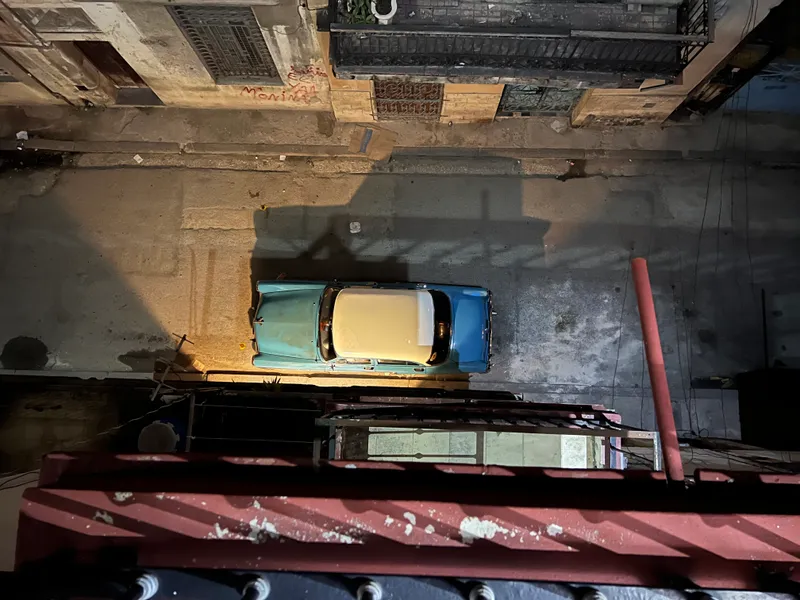Violent crime in Cuba is fairly uncommon, and crime rates in general are low. In fact, locals say that you can go out at night with an expensive camera in your hand and nothing bad will happen. We felt completely safe during our stay in Cuba, in regards to any type of crime, but we wouldn’t show off expensive objects like that anyway.
While in some countries we’ve seen wrongdoers scanning people and their pockets in order to pick a target for pickpocketing, this was never the case in Cuba. However, we strongly advise anyone to follow common sense safety practices anywhere they travel, and Cuba should be no exception.
In Cuba, safety concerns come from other things as well, not just pickpocketing and other petty crimes. Any traveler to Cuba should pay attention to a wide range of safety concerns:
- Transportation Safety
- Safety Regulation at Tourist Attractions
- Buildings Safety
- Political Situation & Freedom of Speech
- Money Scams
- Street Scams
- Lack of Connectivity & Internet Scam
- Food Safety
- Emergency Room & Pharmacies
- Natural Disasters
- Can you travel alone or should you go with a guide?
Transportation Safety
Like everywhere in the world, only use authorized taxis and transportation vehicles, and do not go with strangers who promise to take you to the destination. The easiest thing to do is to talk with your accommodation host and ask him or her to book a taxi for you. Hosts know local taxi companies and even taxi drivers with whom they usually collaborate and had good reviews from fellow travelers. In case you decide to take a taxi from the streets, always remember to agree on the fare before jumping inside the car. Read our complete guide about transportation in Cuba to learn more about how to get around.
Even so, the cars used for transportation in Cuba are very old. One should never forget that we are talking about old cars, in a country that doesn’t have a supply of replacement parts to fix them. This significantly increases the safety risks during transportation.
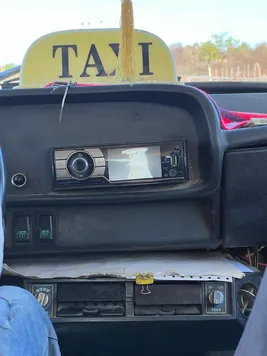
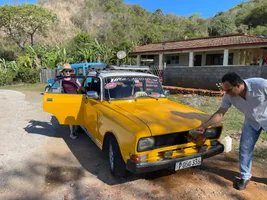
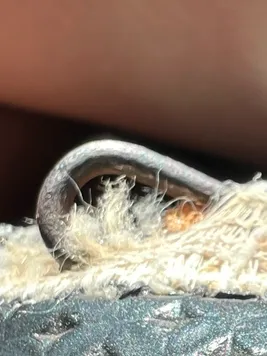
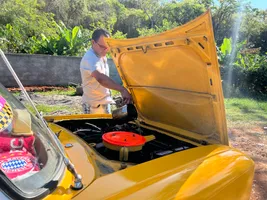
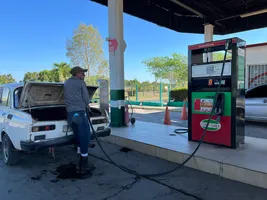
- Forget about seat belts or airbags!
- In some cars, you can see the asphalt through the floor of the car.
- The engine cooler didn’t work and the driver had to take breaks and throw cold water on the engine to cool it down.
- A metal wire was coming out of the rear seats
Note: Schedule everything with enough room for error. If you need to go to the airport consider that your taxi is an old car that might break on the way, and that you have to take another one. It’s better to arrive too early than too late. The car in the article’s main photo is the taxi that waited for us to take us to the airport.
Safety Regulation at Tourist Attractions
Keep in mind that, in Cuba, everything you do, you do it at your own risk. There is no disclaimer anywhere stating this, but this is how things work. Additionally, there are no safety measures, regulations, or standards around tourist attractions. There might be falling rocks, or other kinds of dangers that in Western countries are prevented or minimized, but not in Cuba.
Always remember when going inside caves, for example, that everything is at your own risk, and that nobody ensures your safety there. The same thing applies to boats and every other tourist attraction. We’ve been in a few caves, and we’ve seen concrete stairs destroyed by huge rocks that have fallen over them.
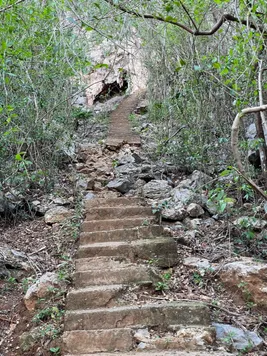
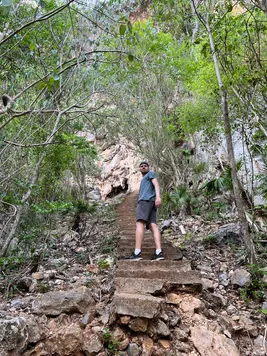
Buildings Safety
This is a rather peculiar safety risk, but, especially in Old Havana, buildings are so old and unmaintained that they are falling apart. Pieces of rocks might fall from the balconies or building facades. Look up and try to avoid walking under ruined balconies where you can see that the concrete is disintegrating.
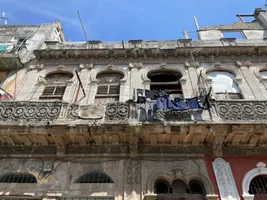
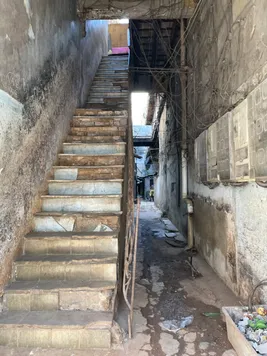
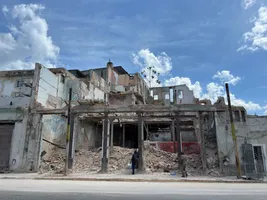
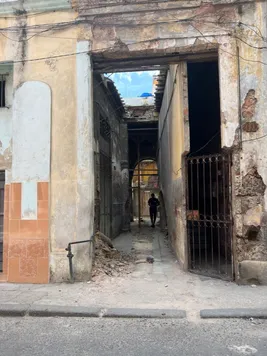
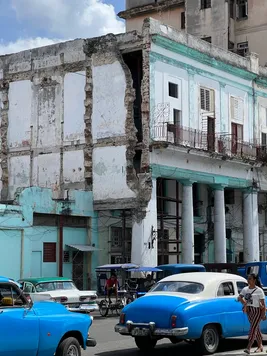
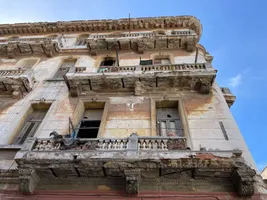
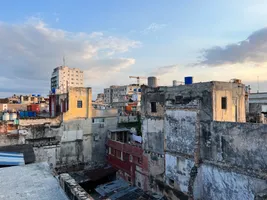
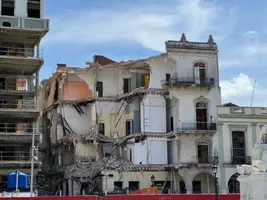
Gas leaks are also a great deal in Havana. We felt the smell of gas on a few streets in Havana, and we’ve also seen the remnants of a gas explosion that took place in 2022 in a hotel. How can you be safe from gas explosions? You simply can’t! This is a safety risk that you have to take in Havana and hope that you won’t be in the wrong place at the wrong time.
Political Situation & Freedom of Speech
The political situation in Cuba is delicate, and political protests, demonstrations, or gatherings are tightly controlled. It is crucial to avoid engaging or being coerced in any political activities or discussions. Respect local laws and customs, and avoid political discussions that could be seen as critical of the country.
Money Scams
Money scams are extremely common in Cuba and can happen anywhere. The rule of thumb is to trust nobody, and always count your money and the money you receive from others. Money scams can happen at a shop, at a restaurant, or perhaps when you exchange money. Every time you give and receive money make sure to count it well.
We come from a world where card payments made us forget how it is to handle so many money bills, and counting them seems to take forever. Initially, I had the feeling that it was impolite to waste everyone’s time while counting a huge pile of bills. Then I realized, that it is part of their money culture. What seems weird and impolite for me, is normal for them. They don’t expect you to take the money and leave without counting them, but they hope you do that so they can scam you. Trustworthy people will ask you to count them immediately when they give it to you, and they will wait for your okay. Counting money doesn’t mean you don’t trust the other person, it’s just a normal behavior around paper money that everybody has and expects you to have as well. I can’t emphasize enough on this: Count the money every time!
It happened to us many times during the 10 days we spent in Cuba, especially when receiving change for something we paid. Pay increased attention especially when using higher bills, like the 500 CUP bill. We bought some drinks from a store, and the cashier counted the change in a weird way, mixing bills of different values between them and giving us less change. We noticed something was wrong and started counting the change in front of the cashier to prove it, but she knew it and pulled out the rest of the correct change before we even started counting.
Restaurants are another place where change can be an issue. Either because you pay in USD or EUR and they give you the change in CUP at a bad exchange rate, or because they don’t give you the correct change. We went many times to the same restaurant in Havana, and always tipped generously. Even so, on our last visit, they tried to give us significantly less change. It is worth mentioning that we were out of CUP and we paid with a 100 USD bill. We knew beforehand that the exchange rate at this restaurant was not bad (170 CUP for 1 USD), but the food was cheap (25 USD), and the change they had to give us was a large amount for Cuba. In the end, they didn’t have enough CUP to give us change and ended up giving USD.
As a civilization, we forget the skill of counting money bills, but in Cuba, we have to be patient with ourselves and others and count count count!
Money is a complex subject when traveling to Cuba, and we have dedicated an entire article to this topic. We recommend you check it out:
 Travelfoss
Travelfoss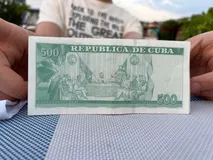
Street Scams
It is a common practice to be approached by locals, especially in Havana, who are trying to scam you, sell you something that is fake or of low quality, or just to get a commission. Here is a list of the most common types of scams you will hear:
- Cigar, Salsa, or other festival. The most common scams start with someone telling you that today is the last day of some type of festival that is taking place in Havana. It usually is about cigars (puro) or salsa. They will either try to sell you some cigars of questionable quality or take you to some salsa classes and earn a commission from the dance club.
- A friendly local. This scam can have multiple approaches and purposes. He might pretend to be a worker at a cigar factory that has cigars for sale. Someone approaches you in a very friendly manner, or he pretends to know the hosts from your accommodation (he might even know their names). He might want to show you around as a guide and ask for tips. He might want to take you to some shops or restaurants where his friends are working or that agreed to pay him a commission for bringing people in.
As with taxis, if you need recommendations for shops, tours, restaurants, or anything else, ask your hosts from your casa particulares. Those are the people in which you can have more trust. Their earnings from tourism are significant, and, if you have a good time with them, you are more likely to leave a good review that will help them enormously.
Lack of Connectivity & Internet Scam
Access to the Internet is changing rapidly in Cuba. However, the internet is still expensive and limited. When you buy a SIM card with internet, never leave the place without the internet working on your phone. We almost felt for the scam “it will start working in 20-30 minutes, you can leave now”. In reality, they might try to “steal” your internet and use it for themselves. The internet should start working on your phone right away if it has been enabled in their system.
Even if you have internet on your phone, the coverage is poor, and you should expect no connectivity outside city centers. Always download offline maps, and dictionaries and never rely on an internet connection.
Don’t forget that Cuba is tightly controlled, and so is the Internet. A lot of websites are blocked in Cuba, and cannot be accessed. The political situation and freedom of speech remain of concern over the internet as well. To prevent, at least in part, these issues we recommend you use a VPN. With the VPN enabled, your identity is protected, and you can access blocked websites.
Food Safety
In a country where food is often hard to find, the quality of food can be dangerous. There are no or very low standards for restaurant kitchens and how perishable food needs to be stored. We had no significant problems with food in Viñales, but a hard time in Trinidad and Havana.
We encourage anyone traveling to Cuba to enter local shops and stores where they sell food, even if you have no intention of making a purchase. Taking a look doesn’t cost you anything. In fact, it plays a big role in discovering their culture and the way Cubans live.
Spoiled Food & Food Poisoning
We had a bad experience with fish in Trinidad. The fish had a strange color and texture. It was fried, so it didn’t smell bad. However, it was bad in many ways, so we didn’t have the courage to eat it. It is always safer to not eat rather than to eat something your gut is telling you is not okay.
For most of us fish of the day refers to fish that was caught that same day, usually in the morning. We asked a waiter in Havana if the fish of the day was fresh, and she said yes. We insisted if it was from today or yesterday, and she started laughing. She said that no restaurant in Havana had fish from today or yesterday: “The fish is from this month.” she said, and the date was April 8. Do you consider a fish fresh or even safe to eat after 7 days?
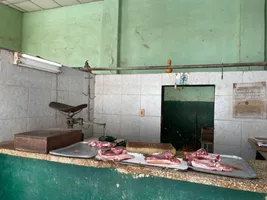
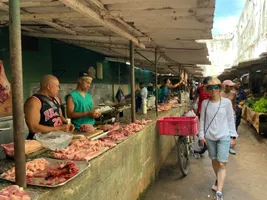
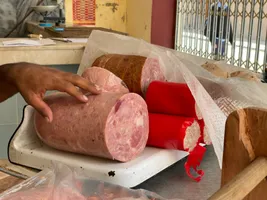
It’s not only about fish. Any kind of meat and cheese is sensitive to high temperatures and develops harmful bacteria if kept for long periods of time outside the fridge. Not to mention that we are talking about Cuba, where outside temperatures are high. While exploring Havana we’ve seen meat and cheese for sale, all outside, with no fridge in sight. Some places had a smell so bad I could not go near them. I can’t even imagine what could happen to us if we eat that.
So what can we eat? We mainly turned towards vegetarian dishes, like rice, and simple pasta with tomato sauce. And this takes me to the next topic:
Foreign Objects in Food
We thought that by avoiding perishable foods we would be safe with what we eat. We discovered the hard way how wrong we were.
In Trinidad, Stefan discovered a glass shard while chewing his rice. Unfortunately, he chewed the glass shard and broke a dental crown. Luckily, it wasn’t an emergency, but it was a terrible experience that changed everything afterward. If you explore their food stores, you will see that rice is not packed, and the way they handle rice makes it easily prone to contamination with foreign objects.
We upgraded our food safety rules from “no perishable foods” to “no perishable foods, and no rice”. Is there anything else that could happen? In Havana, we found a piece of thin metal wire in some pasta with tomato sauce. Our guess is that it was a piece of an old metal wire dish sponge that has seen better days, but, with the poor supply Cuba is facing, they don’t have a replacement.
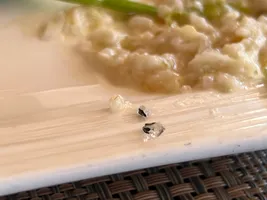
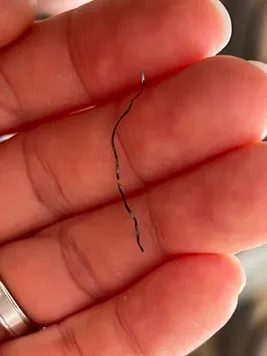
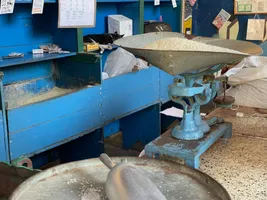
This brings us again to the same question again: what can we eat?
Lack of Food
The best option is to talk to the accommodation hosts and see if he or she can provide you with some food. Our hosts from Viñales cooked for us in the evenings, and the food was amazing. Both, in Viñales and Trinidad we had breakfast at our accommodation, but Havana was different. We knew that our hosts in Havana don’t offer breakfast, but little did we know that we would not be able to find anything to buy. Most restaurants open at lunchtime. If finding a good restaurant was already hard in Havana, finding one with breakfast was next to impossible.
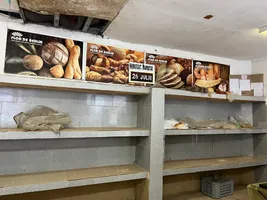
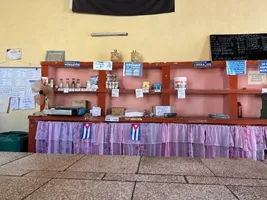
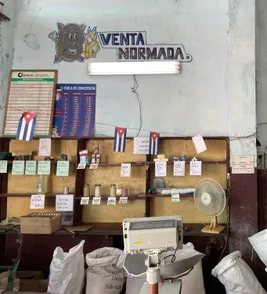
In a place where basic foods are rationalized (productos normados, venta normada), you can’t even buy a loaf of bread as a foreigner. Some locals buy their bread and then sell it on the streets. Considering the shortage of food in Cuba, we didn’t want to take the bread away from the locals. I am sure that someone will buy it. We ended up buying loads of fruits and vegetables from street vendors. Together with some protein bars we had in our bags, they made up some of our meals. In the end, we lost a few pounds, we were starving, but we stayed safe.
It was hard to find food while traveling between Viñales and Trinidad as well. In Havana, at the bus terminal, the shelves were empty everywhere. We ordered a cheese sandwich, but it had such a bad smell that we couldn’t eat them. The other 2 small things in the photos below were pork croquettes in theory, but in reality, they didn’t seem to have any meat in them.
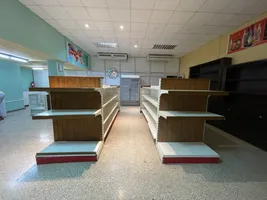

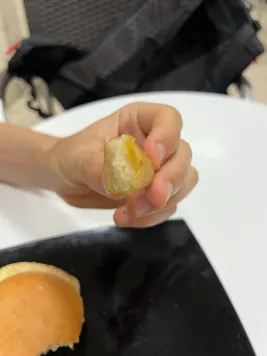
Emergency Room & Pharmacies
Another safety factor that needs to be taken into consideration while traveling is access to medical services. While nobody wants medical issues, they do sometimes happen, and you might need to visit the doctor. We had severe food poisoning once, in Bali, Indonesia, and required medical care. That’s why most travelers, including us, never travel without travel insurance. However, having travel health insurance is not always enough. The quality of the medical services that you can have access to is different from one country to another, and some travel destinations come with greater risks than others.
Emergency rooms are probably the last place anybody wants to visit in Cuba. The emergency rooms that we’ve seen in Havana were not very trustworthy. Even if someone tells us that the medical system in Cuba is good, we have no idea if that someone has the same standards as we do. The healthcare system in Cuba might not meet the standards of Western countries.
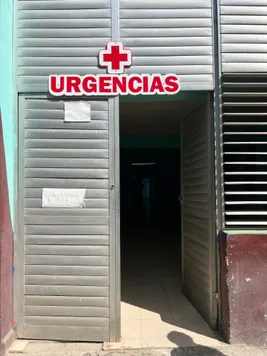
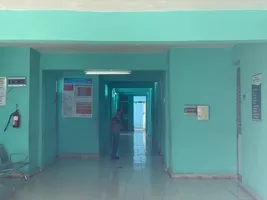
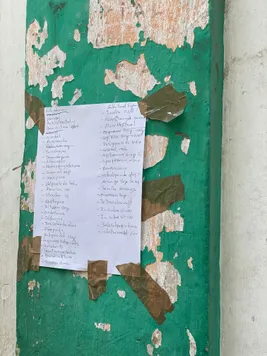
Pharmacies are another delicate topic in Cuba. Don’t forget to take with you any medication that you might need (especially prescription medication) because pharmacies are mostly empty. We heard many locals saying that they are not able to get the medication they require for their medical condition. When a pharmacy receives new stocks, you will see a huge line of people waiting to take their meds. Most of the time there will be a list on the pharmacy’s door with the products in stock. This list is relatively short, and the pharmacy’s shelves are empty.
Natural Disasters
To stay safe in regard to natural disasters, it is advisable to travel to Cuba outside the hurricane season. The hurricane season runs from the beginning of June until the end of November.
Travel Alone
We’re a travel couple, and we have traveled to Cuba on our own. We planned every part of the trip and booked everything by ourselves. Language can be the main barrier to traveling alone, as English is not widely spoken. We know some very basic Spanish, at most we can say we are at the A1 level (most basic). All our hosts knew English, and we arranged some transportation and activities through them. We traveled by bus as well and learned the basic Spanish phrases for it. Download and install Google Translate and the English-Spanish dictionary, and you should be able to manage almost any situation.
Small Group Travel
In case you don’t feel comfortable to travel alone in Cuba, we suggest you try a small group guided trip. Our favorite small group travel company is G Adventure, and it is our go-to option for destinations where we prefer to be with a guide that handles everything for us.
If you’re young and care to be in a group with the same age people, we would advise you to call G Adventures before booking a trip and ask for the ages of the people already in. They will gladly tell you, and you can make a more informed decision.
Discover Cuba Alone
If you are an experienced traveler and feel confident that you can travel to Cuba by yourself, then explore our entire range of articles about places to see and activities to do in Cuba. Learn how to handle money, make payments, and how to stay safe during your entire trip:
 Travelfoss
Travelfoss
Related Travel Articles
- Trinidad Itinerary: What to do in 2 (or more) Days
- Discovering Trinidad, Cuba: Exciting Things to See and Do
- Trinidad Nature Escapes: Playa Ancón, Topes de Collantes, and Valle de los Ingenios
- 7 Unique Travel Destinations for 2024
- Trinidad, Cuba: Heritage, History, and Hidden Delights Revealed
- Unmasking the True Cuba Experience and Societal Realities
- Top things to do in Viñales, Cuba: Activities and Experiences You Can't Miss
- Traveling to Viñales: What You Need to Know Before You Go
- Valle el Silencio: Hiking, Horseback Riding, Tobacco, Rum, and More

Writing free, independent and personal travel content since 2021. If you appreciate what we do, then you can return the favor by using the affiliate links below.
- Get your accommodations on Booking.com
- Buy your gear and gadgets from Amazon
- Book flights using Expedia
- Book activities on Get Your Guide
- Book guided trips on G Adventures
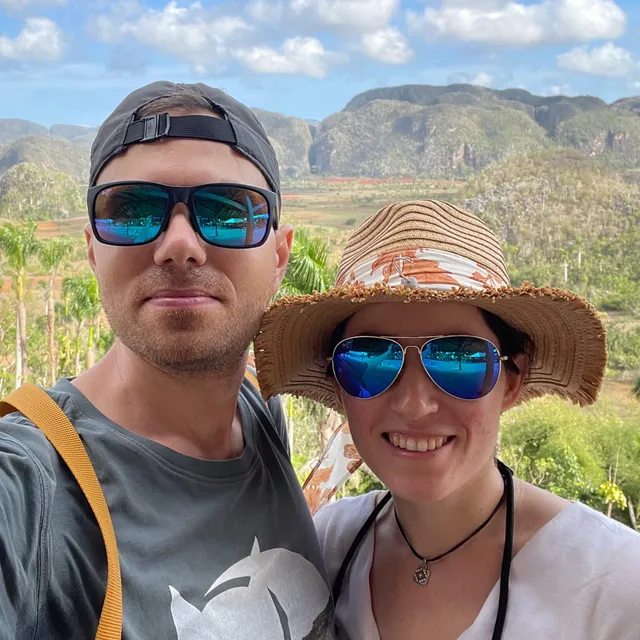
Writing free, independent and personal travel content since 2021. If you appreciate what we do, then you can return the favor by using the affiliate links below with no cost for you.
